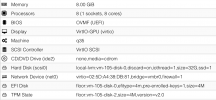Hi!
I read this page: https://pve.proxmox.com/wiki/Benchmarking_Storage
And then I logged into my pve's shell and did the 4k performance check from that page:
I got a pretty decent result:
Then I logged into a Debian 11 VM and did the same command, on the same physical disk, but, of course, it's now going through the LVM-thin storage provided by the PVE. I got this result:
Now, I EXPECT some performance loss from the overhead of going through the LVM-thin storage, but a 69% loss seems excessive.
FYI, here's my Debian 11 VM hardware page:

Anyone have any suggestions?
Thanks!!
-Dutch
I read this page: https://pve.proxmox.com/wiki/Benchmarking_Storage
And then I logged into my pve's shell and did the 4k performance check from that page:
Code:
fio --ioengine=libaio --direct=1 --sync=1 --rw=read --bs=4k --numjobs=1 --iodepth=1 --runtime=60 --time_based --name seq_read --filename=/dev/sdaI got a pretty decent result:
Code:
read: IOPS=16.8k, BW=65.8MiB/s (68.0MB/s)(3948MiB/60001msec)Then I logged into a Debian 11 VM and did the same command, on the same physical disk, but, of course, it's now going through the LVM-thin storage provided by the PVE. I got this result:
Code:
read: IOPS=5192, BW=20.3MiB/s (21.3MB/s)(1217MiB/60001msec)Now, I EXPECT some performance loss from the overhead of going through the LVM-thin storage, but a 69% loss seems excessive.
FYI, here's my Debian 11 VM hardware page:

Anyone have any suggestions?
Thanks!!
-Dutch

